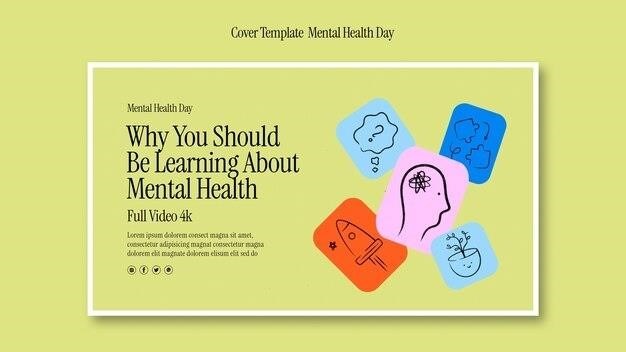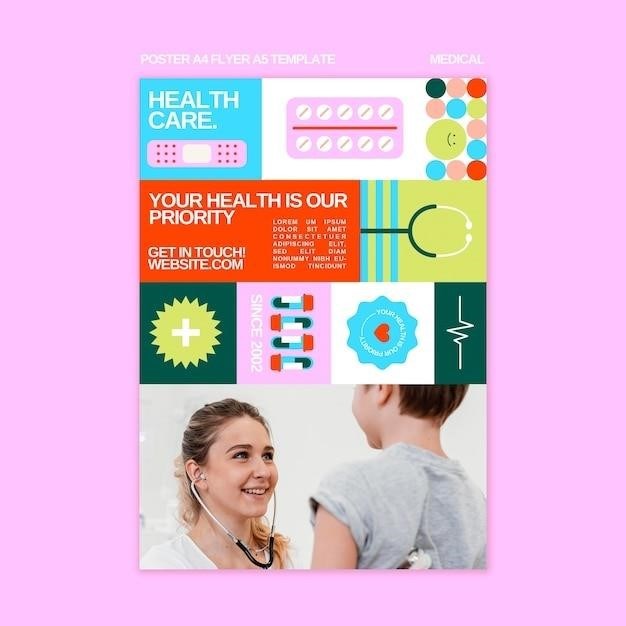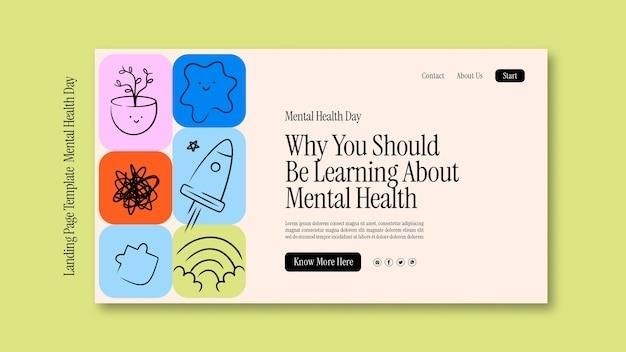mental health games and activities pdf
Mental Health Games and Activities⁚ A Comprehensive Guide
This guide explores diverse mental health games and activities available in PDF format. Resources include worksheets for self-reflection, empathy-building games, mindfulness exercises, and materials for professionals and children. Discover how these tools promote well-being and combat stigma.
Types of Mental Health Games and Activities in PDF Format
Numerous resources offer mental health games and activities in readily accessible PDF formats. These range from simple worksheets designed for self-reflection and mood tracking, such as thought record worksheets and daily mood trackers, to more complex games aimed at fostering empathy and creativity within groups; Many PDFs provide structured activities for mindfulness and grounding techniques, helping individuals connect with the present moment and manage stress. Some resources offer complete activity sets focused on specific skills, like the “Grounding Stones Activity set” which teaches mindfulness and grounding skills. You’ll also find PDFs containing games designed specifically for children and young people, often incorporating fun and engaging elements to make mental health discussions more approachable. For workplaces, there are dedicated activities promoting mental well-being within the professional environment. These diverse formats cater to various age groups, needs, and settings, offering a flexible approach to mental health support.
Worksheets for Self-Reflection and Tracking
Self-reflection and tracking worksheets are invaluable tools readily available in PDF format. These resources provide structured frameworks for individuals to monitor their emotional states, identify triggers, and track progress. A “Thought Record Worksheet” helps users analyze their thoughts, feelings, and behaviors, fostering a deeper understanding of their emotional responses. The “Feeling Wheel” offers a visual aid for identifying and labeling emotions, enhancing emotional literacy. Daily mood trackers provide a simple yet effective way to monitor mood fluctuations over time, allowing for the identification of patterns and potential triggers. Self-care checklists encourage proactive self-care strategies by prompting users to consider different aspects of their well-being. These worksheets are often used in conjunction with therapy or self-help programs, offering a tangible means to enhance self-awareness and promote mental health. The downloadable nature of these PDFs makes them easily accessible and convenient for personal use.
Games for Promoting Empathy and Creativity
Engaging games designed to foster empathy and creativity are readily accessible as downloadable PDFs. These activities encourage collaborative problem-solving and perspective-taking, crucial skills for navigating social situations and building strong relationships. Many games involve role-playing scenarios that challenge participants to understand different viewpoints and emotional experiences. Creative activities, such as storytelling or collaborative art projects, provide outlets for self-expression and emotional processing. These games are particularly beneficial for children and adolescents, helping them develop emotional intelligence and communication skills. The use of games allows for a less formal and more engaging approach to learning about emotional regulation and social dynamics. PDF resources often include detailed instructions and adaptable elements to suit diverse age groups and learning styles, making them valuable tools for both personal use and educational settings. The goal is to build a supportive and understanding environment while fostering imaginative expression.
Activities for Mindfulness and Grounding

Numerous PDF resources offer mindfulness and grounding activities, providing readily accessible tools for managing stress and anxiety. These exercises often involve simple yet effective techniques to center oneself in the present moment. Guided meditations, available in downloadable audio or script formats, lead users through relaxation exercises, focusing on breathwork and body awareness. Visualizations and sensory exercises encourage engagement with the immediate environment, enhancing awareness of sights, sounds, smells, and textures. Grounding techniques, such as focusing on physical sensations or listing five things one can see, hear, touch, smell, and taste, help redirect attention from anxious thoughts. These activities are adaptable to various settings, from quiet personal practice to group sessions. Many PDFs include variations of these exercises, catering to different preferences and needs, ensuring a range of approaches for achieving a calmer state of mind and enhanced self-regulation. The goal is to cultivate a sense of presence and inner peace.
Resources for Mental Health Professionals
A wealth of downloadable PDF resources caters specifically to mental health professionals, offering tools to enhance their practice and client engagement. These resources often include comprehensive activity guides, structured worksheets, and assessment tools, all designed to be easily incorporated into therapy sessions. Many PDFs provide adaptable templates for group activities, promoting collaborative learning and peer support. Some resources focus on specific mental health conditions, offering targeted interventions and techniques. Others offer a broader range of activities for promoting general well-being and coping skills. These materials often incorporate evidence-based practices, ensuring alignment with established therapeutic approaches. Furthermore, many resources include suggestions for adapting activities to suit individual client needs and preferences. Access to these professionally-designed PDFs allows for efficient and effective delivery of therapeutic interventions, saving valuable time and streamlining the therapeutic process. The readily available nature of these digital resources enhances accessibility and allows for easy sharing among professionals.
Games for Children and Young People
The realm of mental health games and activities extends significantly to cater to the unique needs of children and young people. Many PDFs offer age-appropriate games designed to foster emotional intelligence, self-awareness, and coping skills in a fun and engaging manner. These resources often employ playful themes and interactive elements, making learning about mental health less daunting and more approachable for younger audiences. Some games focus on building emotional vocabulary, helping children identify and articulate their feelings. Others promote social-emotional learning by encouraging empathy, collaboration, and conflict resolution. Mindfulness and relaxation techniques are often integrated into these activities, teaching children valuable self-regulation strategies. The use of colorful illustrations, engaging storytelling, and simple instructions ensures accessibility and inclusivity. Many PDFs incorporate creative activities, such as drawing, coloring, or storytelling, stimulating imagination and self-expression. The readily available nature of these digital resources empowers parents, educators, and therapists to easily implement fun and effective mental health activities within a child’s routine.
Activities for Workplace Mental Health
Promoting a positive and supportive work environment is crucial for employee well-being. Numerous PDFs offer readily accessible resources specifically designed to enhance mental health in the workplace. These materials often include interactive exercises and team-building activities that encourage communication, collaboration, and stress reduction. Many focus on mindfulness techniques, providing practical strategies for managing workplace stress and improving focus. Some PDFs incorporate games and challenges that build camaraderie and foster a sense of community among colleagues. These activities can range from simple icebreakers to more complex problem-solving scenarios, all aiming to boost morale and improve team dynamics. Additionally, many resources provide templates for creating personalized self-care plans, helping employees identify their stressors and develop coping mechanisms. By incorporating these activities into workplace wellness programs, companies can proactively support employee mental health, leading to increased productivity, improved job satisfaction, and a more positive work culture. The readily available format of these PDFs makes implementation convenient and cost-effective for organizations of all sizes.
Benefits of Using Games for Mental Health
Incorporating games into mental health initiatives offers a multitude of advantages. Games provide a fun and engaging approach to addressing sensitive topics, making them particularly effective for younger audiences or individuals who might find traditional therapeutic methods daunting. The interactive nature of games fosters self-awareness and encourages self-reflection in a less intimidating way than direct questioning. Many games promote empathy by requiring participants to consider different perspectives and understand diverse emotional experiences. This is particularly valuable in activities designed to address social skills or improve communication. Furthermore, games can be incredibly effective tools for building resilience. By tackling challenges and overcoming obstacles within a game environment, individuals can develop coping mechanisms and strategies for managing stress and adversity in real-life situations. The sense of accomplishment derived from successfully completing a game can also boost self-esteem and confidence. The non-judgmental and playful nature of games creates a safe space for exploration and self-discovery. This makes them ideal for addressing a broad range of mental health concerns, from anxiety and depression to social isolation and low self-esteem.
Target Audiences for Mental Health Games
The versatility of mental health games and activities makes them suitable for a wide range of audiences. Children and young people benefit immensely from age-appropriate games that foster emotional intelligence and coping skills. Engaging games can help children navigate complex feelings and learn healthy ways to manage stress and anxiety within a fun and interactive context. Teenagers, facing unique pressures, can benefit from games that promote self-esteem, communication skills, and conflict resolution. Adults, too, can find value in games designed to address workplace stress, improve mindfulness, and enhance overall well-being. Tailored games can help adults develop coping mechanisms for anxiety, depression, or burnout. The workplace is another significant target audience. Games can be incorporated into team-building exercises to foster a supportive work environment and improve communication. Furthermore, games can be valuable tools for mental health professionals, providing engaging and effective resources for use in therapy sessions or workshops. The adaptable nature of these games allows for customization to meet the specific needs and preferences of any given individual or group.

Finding and Utilizing PDF Resources
Locating high-quality PDF resources for mental health games and activities requires a strategic approach. Begin by searching reputable websites of mental health organizations, educational institutions, and government agencies. Many offer free downloadable resources, including worksheets, activity guides, and game templates. Utilize specific keywords in your searches, such as “mental health games PDF,” “mindfulness activities printable,” or “emotional regulation worksheets.” When evaluating PDFs, check for credentials of the authors or organizations to ensure accuracy and validity of the information. Look for clearly structured content, age-appropriateness, and evidence-based approaches. Once you’ve found suitable PDFs, consider printing them for easy access and use. If using digital copies, ensure compatibility with your devices. Remember to always respect copyright restrictions. Before implementing any activity, especially with children or vulnerable adults, carefully review the instructions and ensure the activities align with the participants’ needs and abilities. Supplementing the PDFs with your own creativity and adapting them to suit individual preferences can enhance their effectiveness.
Addressing Mental Health Stigma Through Games
Games and activities offer a unique and engaging approach to tackling the pervasive issue of mental health stigma. By presenting mental health topics in an interactive and fun format, these resources can help normalize conversations around mental well-being. Games can foster empathy and understanding by allowing participants to step into the shoes of someone experiencing mental health challenges. The interactive nature of games facilitates open communication and reduces the sense of isolation often associated with mental illness. PDF resources can be particularly helpful in this context, as they provide accessible and shareable tools for educators, therapists, and community groups. They can be utilized in workshops, group sessions, or even as individual learning tools. Activities that encourage self-expression, such as creative writing prompts or art-based exercises, can help individuals process their emotions and experiences in a safe and supportive environment. Furthermore, incorporating elements of storytelling and role-playing can help break down stereotypes and foster compassion. The goal is to shift the narrative from one of shame and secrecy to one of open dialogue and understanding, ultimately creating a more inclusive and supportive environment for everyone.
